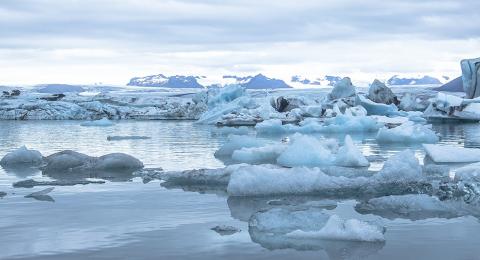The Climate Science minor at UNH offers a comprehensive understanding of Earth's climate system, exploring the mechanisms and feedbacks that drive modern climate, as well as the history and future of climate change. You'll study both natural and human-induced changes across various timescales, have the opportunity for diverse research opportunities, equipping you with the knowledge to tackle climate-related challenges. This minor complements majors in fields like business, sociology, geography, or engineering, and prepares you for careers in law, environmental consulting, science journalism, and more.
WHAT IS CLIMATE SCIENCE?
The Climate Science Minor will provide you with a solid background in the mechanisms and feedbacks that control the Earth's modern climate system. In addition, you will learn about the Earth’s past and future climates, examining natural and anthropogenic climate change on various timescales - from hundreds of years to hundreds of millions of years. This scientific background will serve as a firm foundation as you embark on climate-related studies in other departments, such as business, sociology, geography or engineering. The Climate Science Minor nicely complements other majors at UNH to prepare you for graduate or professional school, or careers in law, business, politics, the nonprofit sector, science journalism or industry.
WHY STUDY CLIMATE SCIENCE AT UNH?
UNH is located on the Great Bay Estuary and close to the White Mountains, providing an ideal backdrop for hands-on learning opportunities for students studying Earth and climate science. You will have multiple options to immerse yourself in research experiences in the field and in state-of-the-art laboratory settings. Increasing needs for energy, environmental protection and responsible land, water and resource management means that those with a background in Earth and climate sciences will be well prepared for the future job market.
POTENTIAL CAREERS
- Business analyst
- Energy sector specialist
- Environmental consultant
- Government agency manager
- Land/water/resource-use steward
- Lawyer
- Oceanographer
- Science journalist
- Secondary school teacher
Curriculum & Requirements
The Department of Earth Sciences offers a minor in Climate Science available to all University students. The Climate Science minor provides an opportunity for students to complement their major field of study with foundational knowledge and essential skills in Climate Science.
Students interested in the Climate Science minor should contact rosemarie.came@unh.edu for more information.
Academic policies related to Minors.
Credit toward the minor will only be given for courses passed with C- or better, and a 2.00 grade-point average must be maintained in courses for the minor.
- Courses taken on a pass/fail basis may not be used for a minor.
- No more than 8 credits used to satisfy major requirements may be used for the minor.
- No more than 2 courses or 8 credits may be from transfer coursework. Any transferred coursework must be approved by the minor coordinator.
For additional details on how to declare a minor, please visit https://www.unh.edu/registrar/academic-records/majors-minors.
| Code | Title | Credits |
|---|---|---|
| Required Courses | ||
| ESCI 401 | Dynamic Earth | 4 |
| or ESCI 402 | Earth History | |
| or ESCI 405 | Global Environmental Change | |
| or ESCI 409 | Geology and the Environment | |
| or ESCI 501 | Introduction to Oceanography | |
| ESCI 514 | Introduction to Climate | 3 |
| Climate and Society Course 1 | ||
| Complete one approved 500/600 level course. Suggested courses include: | 4 | |
SOC 565 | Environment and Society | |
SOC 665 | Environmental Sociology | |
SOC 693 | Global Change and Social Sustainability | |
GEOG 405 | There Is No Planet B | |
GEOG 473 | Elements of Weather | |
GEOG 574 | Global Landscapes and Environmental Processes | |
CEE 520 | Environmental Pollution and Protection: A Global Context | |
| Quantitative/Statistics Course 2 | ||
| Select one course from the following: | 4 | |
ESCI 701 | Quantitative Methods in Earth Sciences | |
ESCI 764 | Spectral Analysis of Geophysical Time Series Data | |
MATH 539 | Introduction to Statistical Analysis | |
| ESCI Climate Science Course | ||
| Select one course from the following: | 3-4 | |
ESCI 561 | Landscape Evolution | |
ESCI 642 | Biogeosciences in the Earth System | |
ESCI 705 | Principles of Hydrology | |
ESCI 758 | Introductory Physical Oceanography | |
ESCI 760 | Paleoceanography | |
ESCI 765 | Paleoclimatology | |
ESCI 777 | GIS for Earth & Environmental Sciences | |
ESCI 778 | Remote Sensing Earth & Environmental Sciences | |
| Total Credits | 18-19 | |
- 1
The course meeting the climate and society requirement should be selected in consultation with the Climate Science Minor advisor.
- 2
Students may fulfill the quantitative/statistics requirement using any approved statistics course.
Program Learning Outcomes
- Understand the broad attributes of and interactions within the Earth System.
- Describe the history of Earth's climate, how and why the climate is changing today, and how those changes impact society.
- Perform simple statistical calculations to process and evaluate quantitative climate science data.
- Summarize, analyze, and evaluate the primary climate sciences literature.






